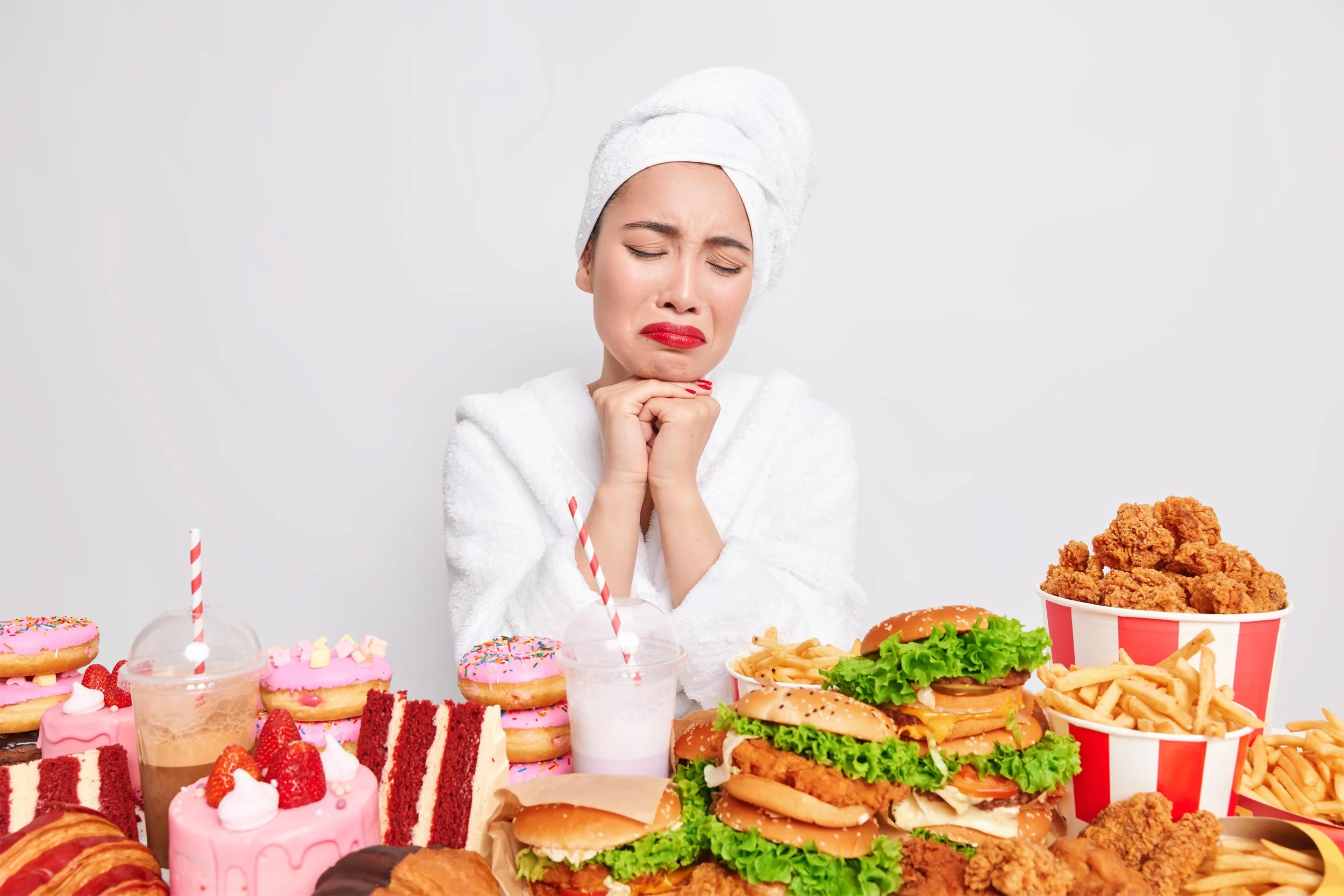How Diet, Sleep, and Stress Affect Skin Glow (With Science, Not Vibes)
This post contains affiliate links. As an Amazon Associate, I earn from qualifying purchases—at no extra cost to you. I only recommend products I truly believe in.
🧪 Why You Can’t Just “Manifest” a Glow
You’ve slathered the serums. Guzzled the chlorophyll water. Even flirted with celery juice. And yet... your skin still looks like it hit snooze on the glow alarm. Sound familiar?
Here’s the (slightly infuriating) truth: radiant, healthy-looking skin isn’t just about what you put on it. Your skin glow is a full-body status report—one that reflects your sleep habits, your stress levels, and yes, the things you’re eating (or not eating). If you’ve been investing in the world’s fanciest moisturizers while surviving on stress, oat milk lattes, and four hours of sleep... your skin is politely telling you, “Babe, we need to talk.”
The good news? You don’t need to overhaul your entire life. You just need to understand what your skin’s actually asking for. In this post, we’re digging into how your diet, sleep, and stress levels affect your skin’s ability to reflect light, retain moisture, and stay resilient. Think: collagen production, skin barrier repair, and antioxidant defenses—served up with peer-reviewed science and zero fluff.
Because glowing skin isn’t just something you swipe on—it’s built from the inside out.
✨The Science of Skin Glow — What Actually Makes You Radiant
Let’s get one thing straight: “glowing skin” isn’t just a compliment — it’s a biological phenomenon. That lit-from-within radiance we all chase? It comes down to how well your skin reflects light. And spoiler: flaky, inflamed, dehydrated skin doesn’t bounce light. It absorbs it. Like a sock.
So what actually makes skin glow? It’s a combo platter of:
Even tone (less blotchiness = better light reflection)
Smooth texture (rough skin scatters light)
Hydration (plump skin = bounce, baby)
Collagen + elastin support (these proteins keep your skin firm and light-reflective)
Internally, your body’s glow-boosters include antioxidants (to neutralize dullness-causing free radicals), fatty acids (to support the lipid barrier), and vitamins A & C (for cell turnover and collagen production). That’s your skin’s backstage crew—and they’re doing overtime when you eat like garbage, sleep like a raccoon, or stress like a boss.
And here's the kicker: your body prioritizes survival, not selfies. So if you’re skimping on sleep, subsisting on sugar, or drowning in stress hormones, your skin is the first place that starts to look... well, meh. Because biologically speaking, a functioning liver beats glowy cheeks. Every time.
The takeaway? Your skin is a mirror of what’s happening beneath the surface. If you want to glow on the outside, you have to fuel the systems that support it from within.
How Diet Impacts Glow — It’s Not Just Kale and Karma
Here’s the thing no one wants to hear: if your skin’s looking blah, your blood sugar probably is too.
Let’s start with the bad news: processed foods, refined sugars, and ultra-processed carbs (hi, bagels) spike your insulin and increase inflammation. That inflammation slows cell turnover, weakens the skin barrier, and breaks down collagen faster than you can say “glow.” In one study, a high-glycemic diet was directly linked to acne and dullness due to increased oil production and oxidative stress. So yes, your late-night Pop-Tart habit might be dulling your sparkle.
But we’re not here to shame—we’re here to glow. So let’s break down the science-backed MVPs of the glowing skin diet:
🍊 Vitamin C – The Collagen Catalyst
Critical for collagen synthesis and protecting skin from oxidative stress.
Found in: citrus fruits, bell peppers, strawberries, and broccoli
🧡 Vitamin A – For Smooth, Even-Toned Skin
Supports cell turnover and reduces rough, dull texture.
Found in: sweet potatoes, carrots, spinach, liver
💧 Omega-3 Fatty Acids – Barrier Builders
Reduce inflammation and support the lipid layer of your skin.
Found in: salmon, walnuts, chia seeds
🌱 Polyphenols – Your Antioxidant Armor
Found in: green tea, berries, olive oil, and dark chocolate
These compounds protect against oxidative stress, which leads to dullness, sagging, and uneven tone.
🍓 Collagen – The (Slightly Controversial) Glow Support
Hydrolyzed collagen peptides may improve elasticity and hydration according to multiple randomized trials.
☕ But what about coffee, dairy, and wine?
Coffee is fine in moderation (especially if paired with antioxidants).Dairy: The science is mixed. Some studies show a link between milk and acne, possibly due to hormones. If you’re breaking out around the jawline, it might be worth experimenting with a dairy break.
Alcohol: It dehydrates your skin and depletes vitamins A and C. So sip smartly if you want to wake up glowy, not crusty.
💊 Want to Glow on Auto-Pilot? Try a Beauty Supplement Blend
If you're more of a “just give me the capsule” type, you’re in luck. A few premium supplements bundle skin-loving ingredients like vitamin C, beta-carotene, zinc, and hyaluronic acid into one easy dose:
✨ Hush & Hush SkinCapsule BRIGHTEN+
Formulated to target dullness, pigmentation, and oxidative stress with niacinamide, turmeric extract, and zinc.
🍊 HUM Glow Sweet Glow Gummies
Vegan gummies with hyaluronic acid, vitamin C, and vitamin E for hydration and antioxidant support.
Do they have peer-reviewed studies on the full formulas? Not yet. But the ingredients inside are well-documented—and if you're consistent, they may give your skin the inside-out boost it’s been waiting for.
Basically, eat like your skin is paying attention. Because it is.
💤 Sleep: The Ultimate Free Glow Serum
You can spend $120 on a moisturizer… or you can close your eyes and let your body do it for free.
Yep — we’re talking about actual beauty sleep. Turns out, it’s not just something your grandma said while reaching for her cold cream. It’s a real, clinically-backed, glow-boosting phenomenon.
What Happens to Your Skin While You Sleep
When you’re asleep, your body goes into repair mode — and your skin kicks into high gear. Research shows that nighttime is when:
- Skin cell turnover increases
- Microcirculation improves
- Your barrier starts healing from daytime stress (UV, pollution, sugar, life)
If you cut your sleep short, your skin pays for it. You’ll see more dullness, puffiness, fine lines, and irritation.
One study found that just five nights of poor sleep increased water loss through the skin (aka dryness) and slowed barrier recovery. Another? People who were sleep-deprived looked visibly less attractive — duller tone, more shadows, less glow.
So yes, your face is snitching.
The Hormone Bonus
Sleep doesn’t just reset your mood — it resets your glow. When you get enough rest:
- Cortisol (stress hormone) drops
- Melatonin (antioxidant + repair booster) rises
- Human growth hormone increases → more collagen + elastin
Basically, your skin does the heavy lifting at night. But only if you let it.
✨ Sleep Supplements That Support Your Glow
If you need help winding down — or want to supercharge your beauty sleep — these science-backed supplements do both:
🌙 Magnesi-Om by Moon Juice
A calming magnesium powder that supports deep sleep and reduces inflammation. Bonus: it tastes like a berry mocktail.
💤 HUM Nutrition Mighty Night
A two-in-one: valerian + passionflower help you sleep, while ceramides and ferulic acid support overnight skin repair.
Bottom line?
If you're not sleeping, your skincare isn’t working at full power. Think of sleep as the setting spray for your whole glow routine — it locks everything in. Prioritize your bedtime like your glow depends on it.
Because spoiler: it does.
😬 Stress: The Glow-Snatcher You Didn’t Invite
Stress: ruining vibes, digestion, and… your glow.
Let’s not sugarcoat it — chronic stress is a major skin saboteur. When your cortisol levels are constantly spiking (thanks, deadlines and doomscrolling), your skin takes the hit in three major ways:
1. It amps up inflammation
This can trigger breakouts, sensitivity, and flare-ups — especially if you're prone to acne, rosacea, or eczema. Elevated cortisol also leads to more oil production, which = clogged pores and a shiny forehead you didn’t ask for.
2. It breaks down your collagen
That’s right. Chronic stress can speed up aging by degrading your skin’s structural proteins. Think fine lines, sagging, and a loss of that plump, bouncy look. Not cute.
3. It messes with your gut
Your skin and your gut talk to each other — a lot. This gut-skin axis means that stress-induced dysbiosis (gut imbalance) can lead to breakouts, dullness, and inflammation showing up on your face.
✨ Some stress shows up in your inbox. Some shows up on your chin. These can help with the second one:
🌿 PURE SYNERGY Stress Remedy
A powerful organic blend of ashwagandha, rhodiola, holy basil, and schisandra — all clinically backed to support your stress response and reduce cortisol over time. Zero fillers, just pure herbal adaptogens.
🍫 Renude Chagaccino Mushroom Drink Mix
This antioxidant-rich chaga powder helps your skin handle stress and look better doing it. It’s caffeine-free, sugar-free, and tastes like a mocha — minus the crash or cortisol spike.
Final thought?
You can’t avoid stress — but you can absolutely buffer your skin from it. Deep breaths, better boundaries, and a nightly adaptogen latte might not fix your inbox, but they will help you glow through the chaos.
🌞🛏️ Your Daily Inside-Out Glow Routine
Glow isn’t built in a bottle — it’s built in your habits.
Here’s how to put all that science into a simple daily routine that won’t make you hate mornings:
Morning
Hydrate (bonus points if you add lemon or collagen powder)
Eat a colorful, antioxidant-rich breakfast (think: berries + healthy fats)
Take your Vitamin C and omega-3 supplements
Apply sunscreen. Every day. No matter what.
Midday
Don’t skip lunch — fuel up with protein, fiber, and glow-friendly fats
If stress creeps in, take a walk or sip something adaptogenic (hey there, Chagaccino)
Evening
Keep dinner light and loaded with skin-friendly nutrients (leafy greens, olive oil, salmon if you’re fancy)
Take your sleep-supporting supplements
Shut down screens 30–60 minutes before bed — your melatonin will thank you
Aim for 7–9 hours of sleep (your face will notice)
✨ Final Takeaway
Glow isn’t something you slap on your face — it’s built from the inside out.
What you eat, how you sleep, and how you handle stress? Your skin is paying attention. And while consistency might not be sexy, it works.
You don’t need to overhaul your whole life. Just pick one thing — drink more water, try a sleep supplement, add berries to breakfast — and stick with it.
Your glow-up isn’t on pause.
It’s just waiting for permission. 💫
Want to dig Deeper?
If dryness is part of why skin looks flat, you’ll get more glow once hydration is handled, and this dry-skin guide shows exactly what to use.
When your barrier is healthy, lifestyle changes translate to the skin faster, so here’s how to repair the barrier and keep it that way.
For quick, visible results on tired skin, these hydrating masks give a 15-minute glow boost.
🔬 References
Draelos ZD. “Sebum Control in Acne.” J Invest Dermatol Symp Proc. 2005;10(3):230–233.
Loden M. “Role of topical emollients and moisturizers in the treatment of dry skin barrier disorders.” Am J Clin Dermatol. 2003;4(11):771–788.
Kircik LH. “Safety and efficacy of sunscreens in acne patients.” J Clin Aesthet Dermatol. 2016;9(2):25–30.
Narayanan DL, Saladi RN, Fox JL. “Ultraviolet radiation and skin cancer.” Int J Dermatol. 2010;49(9):978–986.
Cohen JL. “Understanding the Role of Collagen Supplements in Skin Aging.” J Drugs Dermatol. 2019;18(1):9–12.
Kalman DS, Heimer M, Valdeon A. “A prospective, randomized, double-blind, placebo-controlled study on the effectiveness of a novel skin nutrient supplement.” J Clin Aesthet Dermatol. 2015;8(2):25–32.
Oyetakin-White P, Suggs A, Koo B, et al. “Does poor sleep quality affect skin aging?” Clin Exp Dermatol. 2015;40(1):17–22.
Altemus M, Rao B, Dhabhar FS, et al. “Stress-induced changes in skin barrier function in healthy women.” J Invest Dermatol. 2001;117(2):309–317.
Bowe WP, Logan AC. “Acne vulgaris, probiotics and the gut-brain-skin axis - back to the future?” Gut Pathog. 2011;3(1):1.
Darlington LG, Ramsey NW, Kendall MJ. “The influence of stress on skin disorders.” J Psychosom Res. 2002;52(4):455–457.
Farris PK. “Topical vitamin C: a useful agent for treating photoaging and other dermatologic conditions.” Dermatol Surg. 2005;31(7 Pt 2):814–817.
Boelsma E, Hendriks HF, Roza L. “Nutritional skin care: health effects of micronutrients and fatty acids.” Am J Clin Nutr. 2001;73(5):853–864.


